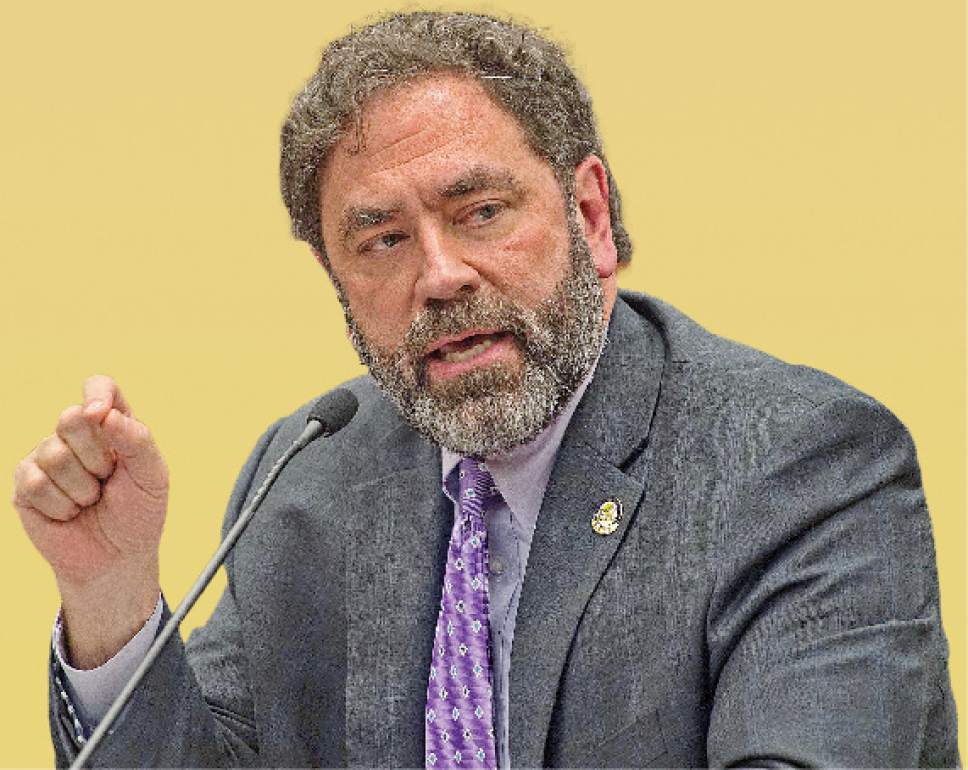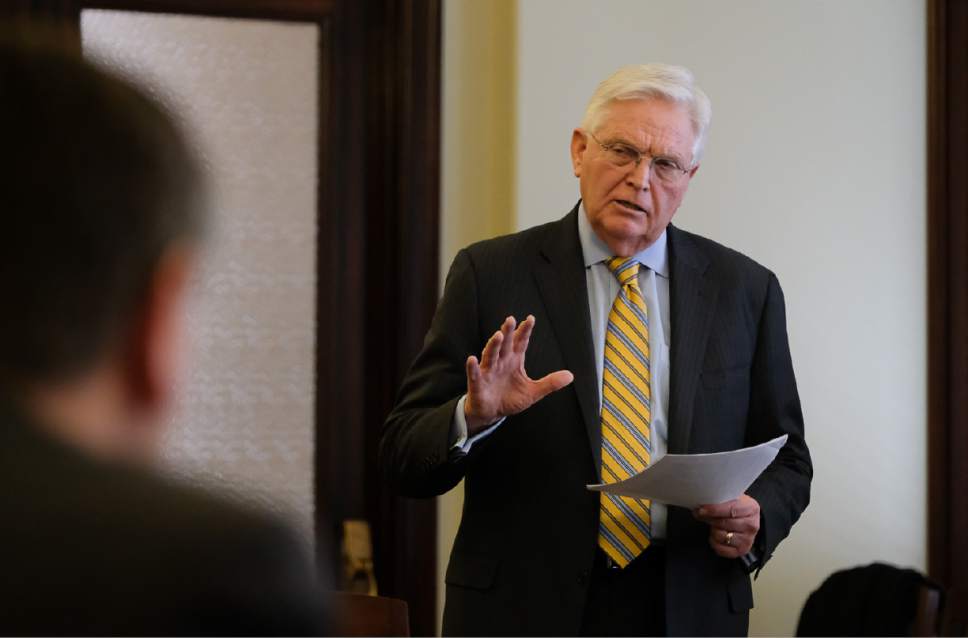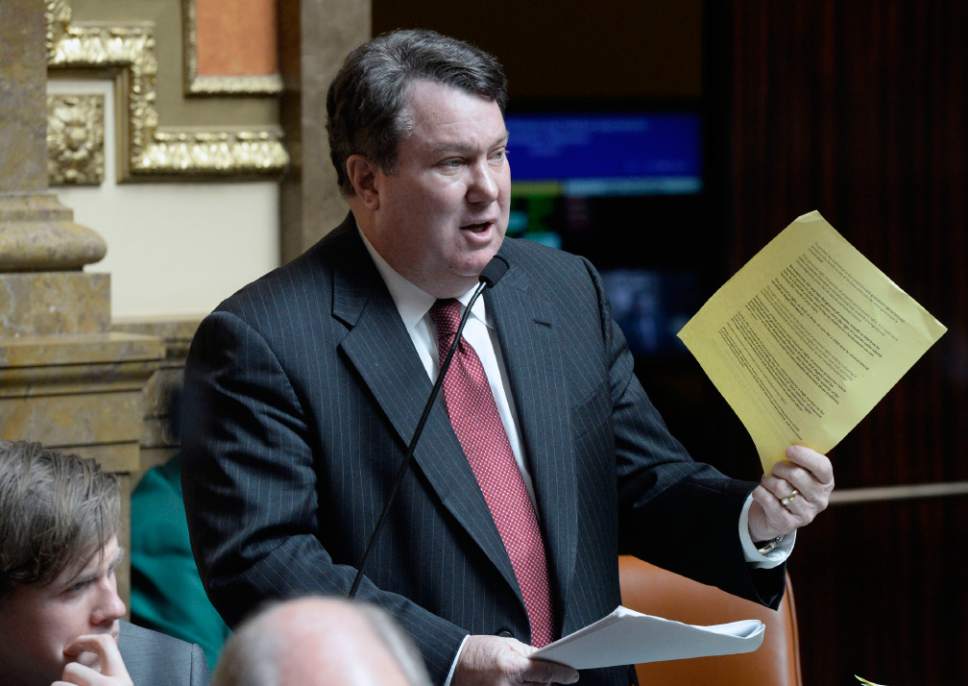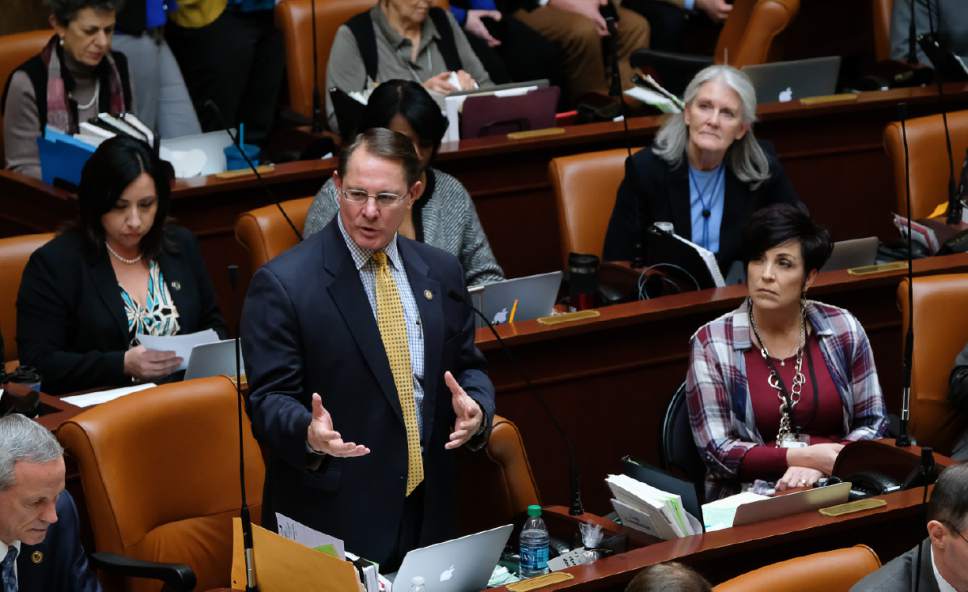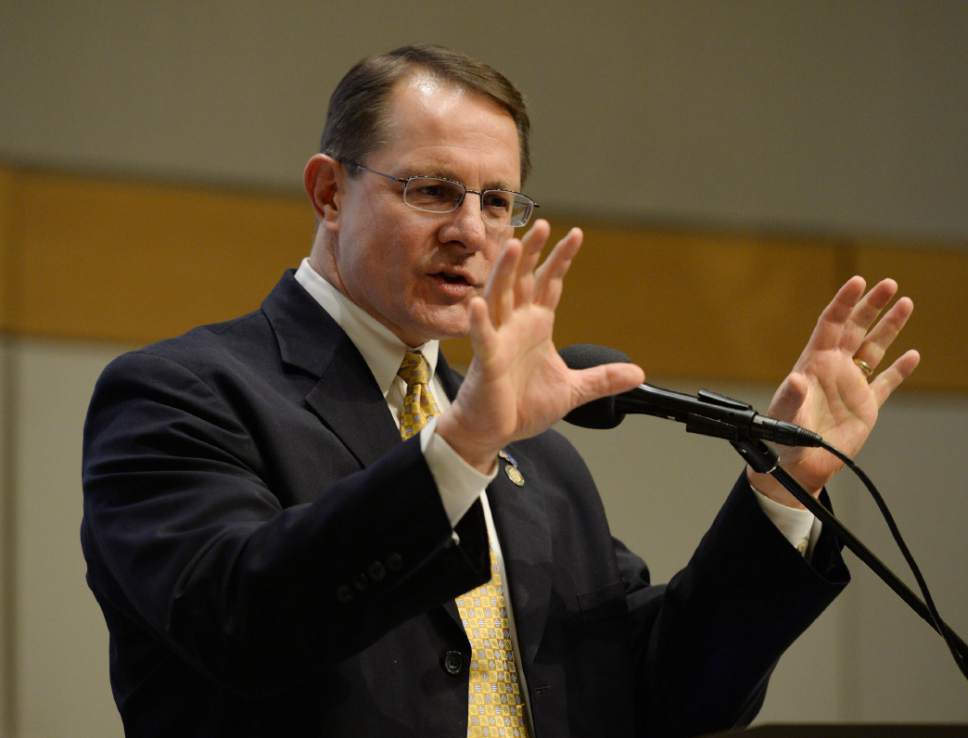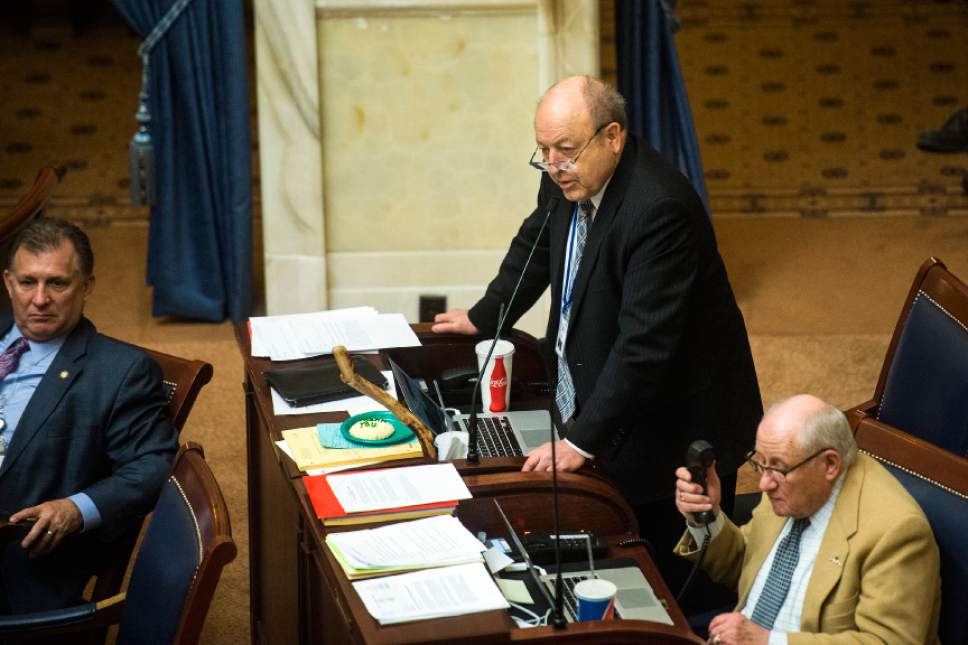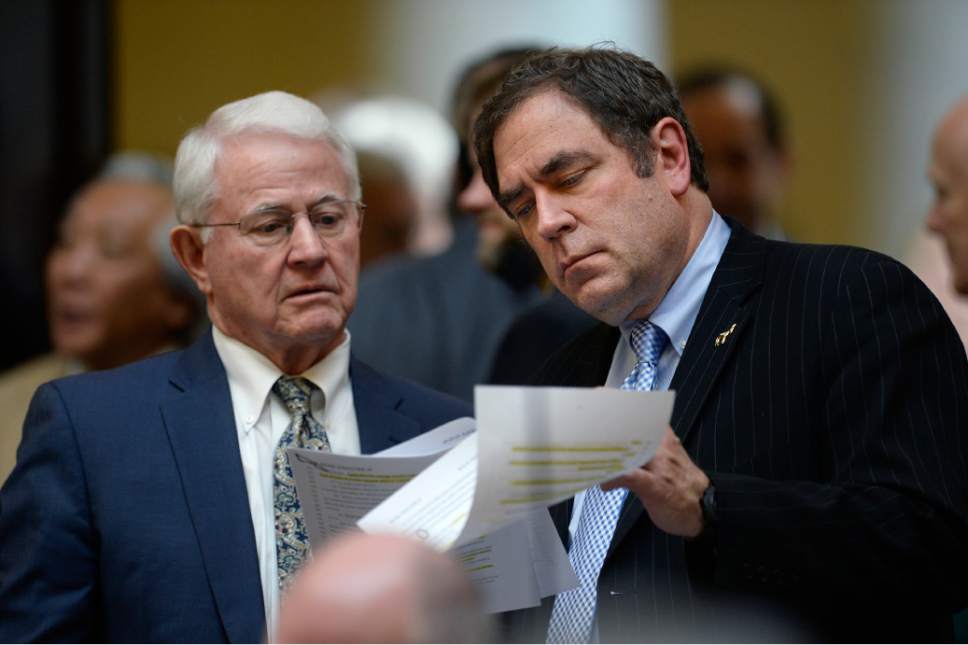This is an archived article that was published on sltrib.com in 2017, and information in the article may be outdated. It is provided only for personal research purposes and may not be reprinted.
Some Utah legislators write laws at the Capitol that they turn around and fight over in state courts.
Like all of the state's part-time lawmakers, the 14 practicing attorneys in the House and Senate step away from their day-job grind for 45 days to take up the legislative sausage grind. And, just as all their colleagues on Capitol Hill, they are required, for the sake of transparency, to file conflict-of-interest forms to let the public know who pays the bills.
But the lawmakers who are attorneys usually list only the law firm they are employed at — a disclosure that doesn't tell residents much about their clientele or their possible conflicts of interest.
To learn more, The Utah Investigative Journalism Project (http://www.utahinvestigative.org), in partnership with The Salt Lake Tribune, gathered records of state and federal court filings for the past five years to provide a deeper look at who these attorneys are representing when they're not on the state clock.
The resulting analysis found that 11 of the 14 practicing lawyers in the Legislature made 585 court appearances, mostly in state court and primarily arguing business-law cases, such as breach of contract. However, the single largest number of cases — 164 — were divorce and annulment disputes. More than 80 percent of them were handled by Sen. Lyle Hillyard, R-Logan, the longest-sitting lawmaker and, until recently, head of the powerful budget committee.
Cases handled by these legislators can, at times, shed light on the occasionally precarious positions they find themselves in between writing laws during the session and fighting over them in court.
Just-retired Rep. Kay McIff, R-Richfield, for example, wrapped up a two-year-long water-rights case and then passed legislation the next session that, among other things, made it easier for water-rights lawyers to collect legal fees in those kinds of disputes. There also was the case of Rep. Ken Ivory, R-West Jordan, who represented a company tied into Utah's controversial business-opportunity call-center industry at the same time he was virtually a lone voice in the Legislature defending then-Attorney General John Swallow, who, among other things, was accused of a pay-to-play relationship with the so-called "biz-op" industry.
—
Switching hats • Rep. Brian King, minority leader in the House, enjoys his law practice, consisting mostly of representing desperate clients in federal court who have been denied insurance benefits.
In 2012, however, the Salt Lake City Democrat squared off in state court against the Utah attorney general's office as he represented optometrist Paul Paxman against accusations of fraudulently billing nearly $40,000. The doctor was even alleged to have bilked the Public Employees Health Plan of more than $9,701. The doctor pleaded guilty in November 2012 and avoided jail time by being allowed to continue to work so he could pay back ill-gotten gains, which he did in full last year.
King didn't believe that the case put him in an awkward position because of his elective post.
"It's your client and you're doing the best you can for them and the assistant A.G. is doing what they can; it's sort of the nature of the business," King said. "Everybody recognizes that we wear different hats at different times, doing different things."
Their legal practices also make for some other interesting attorney-client relationships among lawyer-legislators.
Rep. V. Lowry Snow, R-St. George, is a founding partner of Snow, Jensen & Reece and specializes in business and real-estate law. But he has appeared several times in municipal justice courts on cases outside his usual wheelhouse. In 2012, he represented the son of the former director of the Five County Association of Governments in Santa Clara City's justice court on lewdness and disorderly conduct charges. In 2014, he defended the son of Alan Crooks — Attorney General Sean Reyes' campaign manager — in the Washington County Justice Court in a traffic case. Court dockets show the charge was a misdemeanor, but that the accident resulted in "death/serious injury."
Snow said both cases were billed like any other, and that he's known Crooks long before Reyes became attorney general.
"Alan has been a client of ours for the past 10 years," Snow said. "He used to live in St. George."
Rep. LaVar Christensen, R-Draper, champions family values on Capitol Hill and in private practice also finds time for family. He has represented his nephew's real-estate interests in an ongoing contract dispute over developments on Draper's Traverse Mountain communities that has raged since 2009. He also defended his nephew when he tussled with an Alpine police officer in 2012, helping to get an assault-on-an-officer charge dropped in exchange for a plea of no contest to a traffic violation and disorderly conduct.
Christensen would not comment on the cases involving family members, responding instead via email about his practice in general: "I continually dedicate and offer extensive legal help for needy individuals and at no charge. I have done so for many years. As a state legislator, I conscientiously avoid any conflict."
King acknowledged the standard conflict-disclosure form isn't very transparent but said it wouldn't be practical for legislators who are lawyers or doctors or accountants to disclose their clients.
The only conflict he worries about is passing bills that would directly benefit his clients.
"There's some bills I've wanted to run, but I've had to say I won't," King said, "because it hits too close to home and my own financial interests."
—
Troubled waters • In August 2012, McIff, the Richfield attorney, filed suit on behalf of the Boulder Irrigation and Water Development Co. against one of its shareholders, Garkane Energy Cooperative, alleging Garkane had unfairly changed its water use when it diverted water at the request of the U.S. Forest Service to benefit fish and wildlife habitat improvements.
The complicated legal feud was settled in October 2014, and, in the 2015, session then-Rep. McIff, a former state judge, passed HB43, that rewrote the way water companies and their shareholders could alter water uses.
McIff said the case had nothing to do with his 2015 bill. Rather it was about getting shareholders and companies to talk to one another. Previously, if a shareholder applied for a change, the water company could just ignore the application.
"This was intended to move that process forward and require honest responses," McIff said. "It's about a process that would avoid litigation and bring people to the table."
The measure also made it so that if shareholders wanted to change their water use, they would have to pay the legal fees of the water company to have a water-rights attorney — like McIff — evaluate the change application. McIff said this was not designed to enrich his field of practice, but was just to protect the interests of water companies.
The Republican lawmaker retired this year after finishing a 10-year stint in the Utah House.
Other legislator-lawyers also have found themselves wearing dual hats. Ivory, has appeared in court on only a handful of cases in the past five years, spending most of his time organizing and advocating on behalf of ideological groups pressing transfer of public lands and power from Washington, D.C., to state government — a cause that has earned him a paycheck and also has been a top focus of his legislative career. But one of his lengthiest court cases was a contract dispute far removed from his usual focus, representing Duvera Financial, a company that's been sued in federal court 15 times in the past decade for violations of the Fair Debt Collection Practices Act.
The company also services Utah's controversial "business opportunity" industry, a group of telemarketing companies that has faced myriad fraud complaints for selling customers nationwide on expensive "coaching" programs to teach them how to do things such as start online businesses. Duvera finances these consumer purchases, sometimes to the tune of tens of thousands of dollars, and has been linked to multiple complaints for its billing practices, including allegedly harassing consumers who tried to cancel the costly services they signed up for.
Ivory represented Duvera in a case that was filed in 2008 but was active as late as 2014.
The West Jordan Republican never received the kinds of donations and support from the telemarketing industry that Swallow, the former A.G., did, but Ivory's representation of Duvera was a tie with the industry he never disclosed as he defended Swallow in the 2013 Legislature, including writing an op-ed piece in The Tribune.
Ivory scoffed at the idea that his work for Duvera represented a conflict he should have disclosed in the midst of the Swallow scrutiny.
"You're completely in outer space, and I'm not going to talk about clients!" Ivory said. He cited legal ethics and also said he doesn't even recall the nature of the casework he did for the company. "You're fishing for things that are absolutely ridiculous."
One publicly embarrassing conflict involving the House's Swallow probe occurred just as it was getting underway in July 2013. Snow, the St. George-based attorney and lawmaker, was removed as chairman of the investigative committee after The Tribune reported he had done legal work for Jeremy Johnson, one of Swallow's main accusers. A former president of the Utah State Bar, Snow had not disclosed the potential conflict to legislative leaders, saying his law partner did most of the work on the case. But he agreed to step down to keep from being a distraction to the committee's work.
—
High bar • Lawyer-legislators may have some inherent conflicts vis-a-vis the court system. Legislators have broad powers, particularly over the budgets of justice courts and state courts. Lawmakers also set the salary range for judges, and state senators vote whether to confirm judicial appointments.
Hillyard, R-Logan, has been litigating since 1968 and legislating since 1980, and for many years had tremendous power over state finances — including the court system — as chairman of the Executive Appropriations Committee. He tells of being in court once when another attorney made a joke about Hillyard being the judges' favorite because he set their salaries.
"The judge heard it and he said, 'Is anyone happy with their salary?' " Hillyard recalled. He said another time, opposing counsel remarked that Hillyard was favored by jurors because he was a legislator — drawing laughter from the judge, who commented it was his experience that legislators were more hated than loved by the public.
Hillyard and King argue they've never had any advantage in court, aside from state judges accommodating them by not scheduling hearings during the annual legislative session.
Both say that practicing law has helped them as legislators.
Hillyard said it's good to apply a critical lawyer's eye to proposed bills, and, as a criminal defense lawyer, his clients have taught him empathy.
"As laws get discussed, I think about how does this affect the guy on the street?" he said. "Because that's the people I represent."
Hillyard at least discloses his areas of practice on his conflict-of-interest form and has made it a rule during his career not to accept retainers. He recalls a company offering him a generous retainer even though it wasn't facing any legal actions at the time. He believes the company was just trying to discreetly buy his vote and influence.
"I don't know if every attorney does that, but I turned it down," Hillyard said. "I think they just wanted to wait until there was a legislative issue and then they were going to say, 'We want to use you now.' "
— Eric S. Peterson is the founder and a director of The Utah Investigative Journalism Project. He reported and wrote this article for the project, in partnership with The Salt Lake Tribune. #
From the Capitol to the courthouse
Eleven of the Legislature's 14 practicing attorneys made 585 court appearances in the past five years.
TOP FIVE UTAH LAWMAKERS IN COURT
Lawmaker No. of cases Appearances Type of cases
Sen. Lyle Hillyard, R-Logan 72 202 mostly divorces/annulments
Rep. LaVar Christensen, R-Draper 47 125 contracts, family law, criminal defense
Rep. V. Lowry Snow, R-St. George 35 79 contracts, property rights, family law, criminal defense
Rep. Brian King, D-Salt Lake City 32 67 insurance benefits
Sen. Todd Weiler, R-Woods Cross 25 41 contracts, family law
TOP FIELDS OF PRACTICE PER LEGISLATOR/LAWYER
(based on court records and conflict-of-interest forms)
Rep. Tim Hawkes, R-Centerville Trout Unlimited, conservation group
Rep. Craig Hall, R-West Valley City Intermountain Healthcare.
Rep. Daniel McCay, R-Riverton Suburban Property Reserve, real-estate deals for LDS Church
Rep. Ken Ivory, R-West Jordan Contracts, personal estate and criminal defense
Rep. Keven Stratton, R-Orem Condemnation
Rep. Brian Greene, R-Pleasant Grove Real estate services
Rep. Michael McKell, R-Spanish Fork Family law, foreclosures, personal injury
Rep. Merrill Nelson, R-Grantsville Attorney for LDS Church
Rep. Kelly Miles, R-Ogden Personal estate, family law


